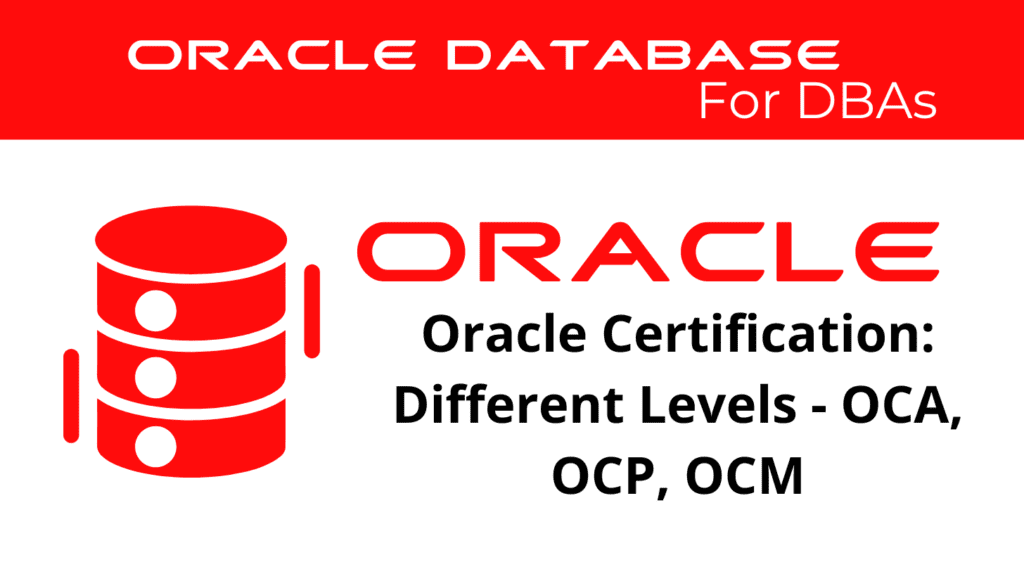
Oracle certifications are essential for IT professionals aiming to validate their skills and advance their careers. This guide will explore the different levels of Oracle certifications, from the foundational OCA to the advanced OCM, and the benefits they offer. Whether you are just starting or looking to enhance your expertise, understanding these certifications is crucial.
Oracle Certified Associate (OCA)
The Oracle Certified Associate (OCA) is the entry-level certification for those new to Oracle technologies. It covers fundamental skills and knowledge required for database administration and development.
Overview of OCA
The OCA certification provides a solid foundation in Oracle database management. It is designed for professionals who want to build a career in database administration or development. This certification ensures that candidates have a basic understanding of Oracle database architecture, SQL, and PL/SQL.
📢 You might also like: 1Z0-076 Exam Dump (Category: Oracle Exam Dumps)
Exam Requirements
To earn the OCA certification, candidates must pass two exams: one focused on Oracle Database SQL and another on Oracle Database Administration. These exams test the candidate’s knowledge and skills in managing and developing Oracle databases.
Benefits of OCA Certification
Obtaining the OCA demonstrates your commitment to learning and mastering Oracle technologies. It opens up entry-level job opportunities and serves as a stepping stone to more advanced certifications like OCP and OCM.
Oracle Cert – Oracle Certified Professional (OCP)
The Oracle Certified Professional (OCP) is for individuals who have gained significant experience with Oracle products and want to validate their advanced skills.
Overview of OCP
The OCP certification builds on the knowledge and skills acquired at the OCA level. It focuses on advanced database administration tasks, including performance tuning, backup and recovery, and security management. This certification is ideal for professionals aiming to take on more complex and challenging roles in Oracle database administration.
Exam Requirements
To achieve OCP certification, candidates must first obtain the OCA certification. Then, they need to pass an additional exam that tests their advanced skills in Oracle Database Administration. Candidates are also required to complete a hands-on training course offered by Oracle.
Benefits of OCP Certification
The OCP certification validates your ability to manage and optimize Oracle databases effectively. It enhances your job prospects, qualifies you for more advanced roles, and can lead to higher salaries. Employers value OCP-certified professionals for their in-depth knowledge and problem-solving abilities.
Oracle Certification – Certified Master (OCM)
The Oracle Certified Master (OCM) is the highest level of Oracle certification, designed for experts with extensive hands-on experience and a deep understanding of Oracle databases.
Overview of OCM
The OCM certification is the pinnacle of Oracle certifications. It requires candidates to demonstrate their skills through a series of rigorous exams and practical assignments. This certification is intended for seasoned professionals who can handle the most complex database challenges and provide high-level solutions.
Exam Requirements
To achieve OCM, candidates must first obtain the OCP certification. They then need to complete two advanced hands-on exams that test their ability to perform complex database tasks under time constraints. These exams cover a wide range of topics, including database design, performance tuning, and disaster recovery.
Benefits of OCM Certification
Earning the OCM sets you apart as an expert in Oracle database management. It is highly respected in the industry and can lead to prestigious job opportunities and leadership roles. OCM-certified professionals are often sought after for their expertise and ability to handle critical database issues.
Oracle Certification – Benefits of Oracle Certification Levels
Oracle Certification offer numerous benefits for IT professionals and organizations alike. This section explores the key advantages of obtaining Oracle certifications.
Career Advancement
Oracle certifications can significantly enhance your career prospects. Certified professionals often find it easier to secure promotions, negotiate higher salaries, and gain access to more job opportunities. Certifications demonstrate your commitment to professional development and mastery of Oracle technologies.
Increased Knowledge and Skills
Preparing for Oracle certification exams helps you acquire in-depth knowledge and develop practical skills that are directly applicable to your job. This process enhances your overall competency and effectiveness as an IT professional, enabling you to handle complex tasks with confidence.
Employer Recognition
Employers recognize and value Oracle certifications as a mark of expertise and reliability. Certified employees are often seen as more capable and trustworthy, which can lead to greater responsibilities and job security. Organizations benefit from having certified professionals who can manage and optimize their Oracle databases efficiently.
Networking Opportunities
Being Oracle certified connects you with a community of professionals who share your expertise and interests. This network can provide valuable support, advice, and opportunities for collaboration, helping you stay current with industry trends and best practices.
See more on Oracle’s website!
Conclusion
Oracle certifications, from OCA to OCM, provide a valuable pathway for IT professionals seeking to enhance their skills, advance their careers, and gain recognition in the industry. By understanding the different certification levels, preparing effectively, and leveraging the benefits of certification, you can achieve success and make significant contributions to your organization.
Be Oracle certified, this world is full of opportunities for qualified DBAs!





